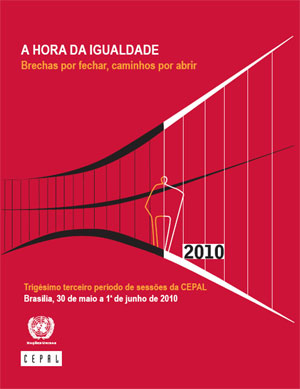Multilateral Cooperation is Fundamental in Avoiding Poverty
In Porto Alegre, Brazil, ECLAC presented the Portuguese edition of "Time for equality: closing old gaps, blazing new trails".

(18 November 2010) According to Antonio Prado, Deputy Executive Secretary of ECLAC, tackling international financial instability through multilateral mechanisms is fundamental in preventing wide swathes of the region's population (who remain vulnerable to extreme volatility and crises) from falling back into poverty.
Mr Prado presented the Portuguese version of the ECLAC document Time for equality: closing old gaps, blazing new trails, at the Federal University of Rio Grande do Sul (UFRGS) in Porto Alegre, Brazil, in front of an audience of professors and experts in development from 50 Brazilian universities.
He also stated that maintaining steady social mobility in Latin America and the Caribbean requires years of solid growth and improved labour market dynamics accompanied by productive convergence.
Ricardo Bielschowsky, Director ad interim of the ECLAC office in Brazil mentioned that the document represents the Commission's analytical tradition that began in 1949 based on the historical structural method.
He added that the report carried on this tradition by recommending, for instance, an unorthodox approach to macroeconomic policy (harmony between growth and stability, pro-competition foreign-exchange policies and anti-cyclical policies), as well as production diversification policies and a reduction of the international productivity gap.
The presentation took place on Thursday 11 November in a special session of the first National Meeting of Professors of Economic Development, jointly promoted by ECLAC, the Federal University of Rio Grande do Sul (UFRGS) and the Brazilian Institute for Applied Economic Research (IPEA).
Time for equality: closing old gaps, blazing new trails was the main document of the Thirty-Third Session of ECLAC, held in Brasilia in May 2010.
The publication analyses the economic situation of Latin America and the Caribbean, presents the impacts of the recent world crisis and crucially provides a new roadmap for the region in this post-crisis scenario. In particular, ECLAC emphasis equal rights as a means of supporting a new development approach.
The study identifies the main gaps that the region must address as it seeks paths to development. These include the productivity gap, or the difference between the region's productivity and competitiveness compared with other world regions in the generation and incorporation of technical progress and decent jobs.
Another gap is territorial, in other words regional disparities within the region's countries that point to the need to introduce policies that ensure proper geographical distribution of the benefits of development.
A third gap is social, and this is measured in income inequalities and reflects deep differences in access to the basic rights accessible to the population.
In all of the gaps studied, the State has a role to play, in the form of its public and economic policies, including those relating to macroeconomic, fiscal, social protection and market regulation aspects.
The Portuguese version of the study was published by ECLAC with the support of the Institute for Applied Economic Research (IPEA).
____________________________________________________________________________________________________________
For further information, please contact: pulcheria.graziani@cepal.org in Brasilia. Telephone: (61)3321-3232 or (61) 3321-5494 or the ECLAC Public Information and Web Services Section in Santiago, Chile. E-mail: dpisantiago@cepal.org; telephone: (56 2) 210 2040.
Contact
Public Information Unit
- prensa@cepal.org
- (56 2) 2210 2040